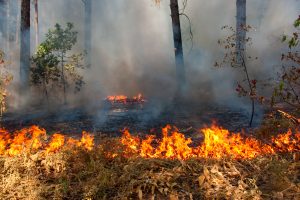4 Steps to Protect Yourself From Wildfire Smoke
With the horrific fires in California comes an abundance of smoke. If you live within the vicinity of the fires, the smoke could be severe. However, wildfire smoke drifts farther from its source than previously thought.
These trends are likely to continue, and wildfires are likely to be a health concern for areas far downwind from where wildfires burn.
Satellite data tracks smoke

In one recent study, researchers discovered that rural wildfire smoke drifts farther from its source than was previously thought. Examining satellite data to track the movement and dispersal of smoke plumes, they found that wildfire smoke drifts at a very high altitude, eventually reaching distant urban centers and interacting with other pollutants to create elevated ozone levels far from the fire source.
Wildfires and heart attacks
Another recent study, published in the Journal of the American Heart Association, reported new evidence of a connection between wildfire smoke particles and acute heart disease, including cardiac arrest. Smoke particles that are 2.5 microns or less in diameter (known as “fine” particles) in particular were found to be associated with a short-term increased risk of cardiac arrest. The study also found an increase in emergency-department hospital visits associated with exposure to fine smoke particles from wildfires.
How to protect yourself from wildfire smoke
There are precautions you should be ready to take if wildfires occur in your area. Here are a few suggestions:
- Protect your indoor air. Keep windows and doors closed. If you use an air conditioner, be sure to keep the fresh-air intake closed. A high-performance air purifier such as the IQAir HealthPro Plus will help remove smoke particles of all sizes from the indoor air. The HealthPro Plus will also help control ozone levels. This is critical if you live in an urban area downwind (even remotely) from wildfires.
- Remain indoors as much as possible. Indoors is often the best place to be when wildfire smoke is affecting your area. This is especially true for those with respiratory or heart disease, the elderly and children.
- Wear a mask outdoors. A paper dust mask or surgical mask is not sufficient to help protect you against inhaling particles. Instead, choose a respirator mask with an N95 or N100 rating to help protect against smoke particles.
- Avoid activities that further pollute the indoor air. Avoid burning candles, using the fireplace, or even vacuuming (unless you own a high-performance HEPA vacuum cleaner). All of these can otherwise become additional sources of indoor air pollutants.
Wildfires can occur with little or no notice, and they can poison the air for hundreds of miles or more. Be ready to react quickly and take the right steps to protect your home and family from unhealthy air quality when wildfires occur. Air Purifiers are great for enhancing the quality of unhealthy air.


